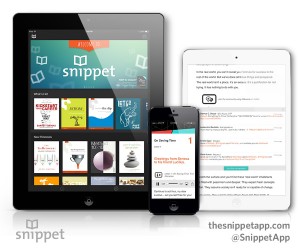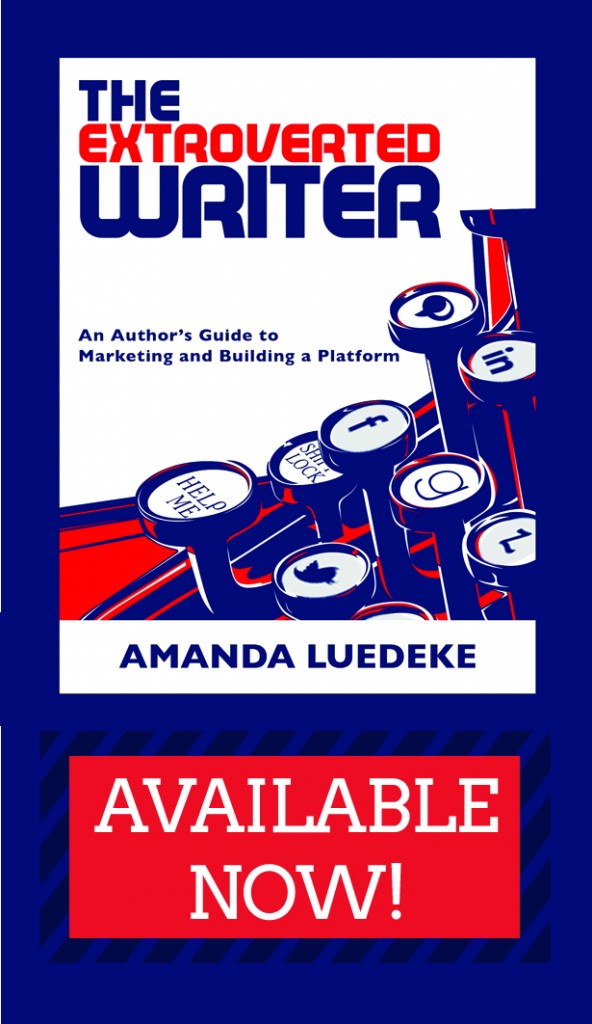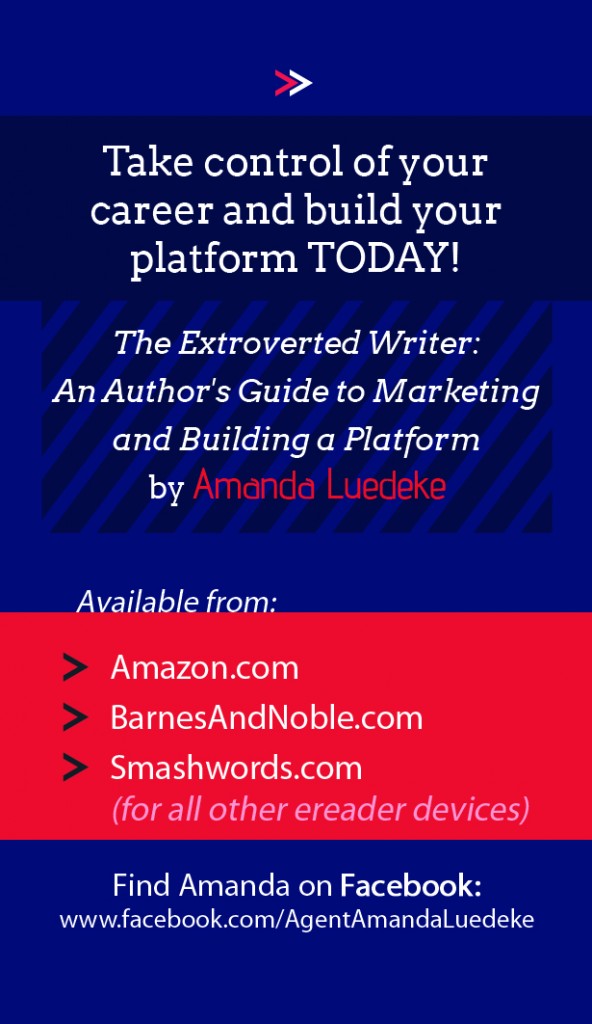- Agents
- Author News, Deals
- Awards
- Bad Poetry
- Blog News
- Books
- Career
- CBA
- Collaborating and Ghosting
- Conferences
- Current Affairs
- Deep Thoughts
- Favorite Books
- Featured
- Film
- Marketing and Platforms
- Proposals
- Publishing
- Questions from Beginners
- Quick Tips
- Religion
- Resources for Writing
- Self-Publishing
- Social Media Critique
- The Business of Writing
- The Writing Craft
- Thursdays with Amanda
- Trends
- Uncategorized
- Web/Tech
Category : Self-Publishing
-
Continue Reading "Thursdays with Amanda: Respecting Your Art"
Thursdays with Amanda: Respecting Your Art
 Amanda Luedeke is a literary agent with MacGregor Literary. Every Thursday, she posts about growing your author platform. You can follow her on Twitter @amandaluedeke or join her Facebook group to stay current with her wheelings and dealings as an agent. Her author marketing book, The Extroverted Writer, is available from Amazon and Barnes & Noble.
Amanda Luedeke is a literary agent with MacGregor Literary. Every Thursday, she posts about growing your author platform. You can follow her on Twitter @amandaluedeke or join her Facebook group to stay current with her wheelings and dealings as an agent. Her author marketing book, The Extroverted Writer, is available from Amazon and Barnes & Noble.An old college friend was telling me a story about a potential client he was talking with. This friend of mine does freelance editing and proofing (he proofed my book, The Extroverted Writer), and so he is regularly courting new clients, trying to meet their expectations while also sharing with them the reality of the business.
This particular client of my friend’s was one of those type A, demanding, bull-headed types. You know who I’m talking about…a real-life Miranda Priestly or Bart Bass. Shrewd. Demanding. With no concept or concern for how much work it takes to produce a quality result.
The client had a 58,000-word manuscript that he wanted proofread, but the real kicker was that he wanted the project done in two days. When my friend pushed back and told him that, with a full-time job and other responsibilities on top of his freelancing gig, there was no way he could get it done and done well in that timeframe, the guy refused to accept such an answer. Said something about how it HAD to be ready for publication and how there was NO ROOM FOR AN EXTENSION.
My friend politely turned the project down.
I used to edit and proofread for a publishing company. They’d hand me a fiction manuscript, give me a week’s worth of time, and then a month later a check for a whopping $150 would hit my account. I had gotten the job after hearing that they needed someone to edit and proof for under $200 a pop. I had
-
Continue Reading "Author Earnings, Amazon, and the Future of Ebooks"
Author Earnings, Amazon, and the Future of Ebooks
There has been a ton of discussion over a report on author earnings by ebook authors (which you can find here: http://authorearnings.com/the-report/), the response to it (http://tinyurl.com/pcebsd5), and the responses to the responses (two of the best are http://tinyurl.com/kbjts5s and http://tinyurl.com/omkjz6v ). If you follow this discussions in our industry, you already know what’s going on: successful self-published author of Wool, Hugh Howey, did a bunch of research and came to the conclusion that self-published authors are selling more books and making more money than those publishing with traditional publishers. It was quickly pointed out that there were some problems with Howey’s work — he sells his books on Amazon, did all his research on Amazon, and (surprise!) came to the conclusion that Amazon is a great place to do your ebooks. Nevertheless, there were really some interesting things that showed up in his research:
—Indie-published ebooks have generally higher ratings on Amazon than Legacy-published ebooks.
—Indie-published ebooks generally cost less than Legacy-published ebooks, possibly leading consumers to the sense of getting better value from indies.
—Indie-published ebooks may be outselling Legacy-published ebooks (this is more inferred than proven).
—Indie-published ebooks constitute a larger percentage of books sales than we’ve been led to believe in the past (Howey estimates it’s more than 50% of all book sales, though his methodology lacks stringent validity testing).
—Indie-published authors of ebooks are earning more per book than Legacy-published ebook authors. (Though his argument that Indie-published authors are making more overall is based on very shaky evidence.)
It’s all fascinating stuff, and I believe his conclusion that publishing’s brightest days are ahead is spot-on. As an agent, I’ve never felt I was one of the people who needed to protect the status quo — the fact is, I believe in authors self-publishing.. Unfortunately, the debate that arose after Howey released his findings was considerably less than insightful. It’s become a fairly
-
Continue Reading "Self Publishing as Amway"
Self Publishing as Amway
BY CHIP MACGREGOR
I’m one of those agents who believes in the future of publishing. I respect the past, but I understand that the old way of doing things won’t work today — everything has changed, we’re in a state of revolution, and people who want to make a living in this business will have to adapt or die. I know that’s true of agents, who must change the way they’re doing things if they expect to make a living in 2014. I think that’s true of publishers, who are big and successful for a reason, and who will continue to try to change their models to remain in business and make money. And I believe it’s also true of authors, who simply have to accept the world has changed and look to the future with a new plan.
The old plan for most authors was clear: write a great book, find an agent, and let him help you land a deal with a publisher. Most authors relied on an advance to make a living, and the full-timers tended to live from one advance check to the next. Royalties were great, when they showed up once or twice per year, but could barely be counted on. The power was in the hands of publishers, and there were a number of middlemen (distributors, retailers, agents) intruding on much of a relationship that SEEMED like it should have been simply “author-to-reader.” In that old system, the roles were clear: the authors wrote books, the agents negotiated books, the publishers produced books, the marketers promoted books, the distributors provided books, and the retailers sold books. Sometimes it didn’t seem fair — as though the authors who were churning out the art didn’t have much control, and were at the mercy of a sometimes fickle or arbitrary system.
Then things changed. Amazon came along and, in essence, removed many of the middlemen. An author
-
Continue Reading "Thursdays with Amanda: I’m an Agent and I Self-Published"
Thursdays with Amanda: I’m an Agent and I Self-Published

Amanda Luedeke is a literary agent with MacGregor Literary. Every Thursday, she posts about growing your author platform. You can follow her on Twitter @amandaluedeke or join her Facebook group to stay current with her wheelings and dealings as an agent. Her author marketing book, The Extroverted Writer, is available from Amazon and Barnes & Noble. Today, it is on sale for $2.99…check it out!
Hi. I’m an agent and I self-published. Nice to meet you.
It goes without saying that when you’re in a certain industry and then specifically choose to do something within that industry but without following industry expectations, it’s going to raise some eyebrows. I mean shouldn’t I be on the side of TRADITIONAL PUBLISHING?! Shouldn’t I HATE Amazon and CreateSpace?
Maybe. But I don’t.
I hadn’t faced much interrogation over my self-pubbing decision until I had lunch with an editor a few months ago. She looked me straight in the eye and asked me why I didn’t traditionally publish. And I knew the question was more than that. It was her asking me why I avoided giving her and her industry my business and instead hopped over to Amazon, the bully on her playground. Was I indicating that I didn’t trust their skills? Was I showing my true colors? Was I making a statement?
There are a number of reasons that I chose to self-publish. Sadly for all of you readers looking for a dose of entertainment, none of those reasons are malicious or argument-inducing. But still, it’s time to talk about it. It’s time to share why I published the way I published…
1. I needed it NOW. I began work on The Extroverted Writer last January. I had effectively established as an agent and deveopled a following, particularly with my marketing advice. But how long was this image going to last? Was I going to tire
-
Continue Reading "My Publishing Predictions for 2014"
My Publishing Predictions for 2014
I sometimes hate reading people’s predictions for the new year, since they tend to be incredibly safe (“a new author will arise and start selling well”) or so obvious a moron could have guessed it (“it will rain a lot in Oregon”). But I enjoy the notion of trying to guess what will happen, since I’ve spent my life in this business, and I tend to try and stay ahead of the curve. So here are my un-safe, non-obvious thoughts on what may happen this year…
1. Amazon is going to start a chain of stores. Maybe it’ll be in airports, maybe they’ll start micro-stores like the kiosks you see selling headphones and chargers in airport terminals, but Amazon NEEDS to find an outlet for their Amazon-branded books. No brick and mortar store will touch them, and they need a presence in paper somewhere.
2. Barnes & Noble is going to be sold but remain in business. Okay, I don’t have ANY insider information, even though my wife worked for them for years. We all know B&N is struggling. They may sell off their Nook business (and I’m a huge fan of my Nook, as I’ve noted on this blog several times), but I don’t think America’s largest book retailer will go under. Instead, I’m wondering if the good folks at Microsoft (who propped up the Nook with an infusion of cash two years ago) might buy the entire chain. Someone will.
3. We’re going to see a bunch of publisher mergers. Hear me out: the rise of ebook readers led to a flood of category novels. That in turn led to the creation of countless smaller publishing houses — start-up companies that focused on one genre. But with ebook sales gone flat, and dedicated e-readers failing due to tablets, a bunch of those semi-successful smaller houses are about to be taken over by the Random Houses and HarperCollins of
-
Continue Reading "Snippet's Writer Dashboard Launches Today (a guest blog)"
Snippet's Writer Dashboard Launches Today (a guest blog)
 I’m excited to be able to share with you that Snippet–a brand new publishing and reading app–is moving their Writer Dashboard from private beta to open beta today.
I’m excited to be able to share with you that Snippet–a brand new publishing and reading app–is moving their Writer Dashboard from private beta to open beta today.As an author, it’s been amazing to be involved with Snippet. (If you missed my post a couple months ago about how Chip became my agent and how my upcoming book became a Snippet, you can catch up on that here.)
Even though Snippet has already gained thousands of readers, it’s still new, so I’ve included some information below about my own experience and about Snippet in general, to answer some questions you might have.
You can request access to their Writer Dashboard starting today, and begin creating your own Snippet at any time!
What does Snippet mean for writers?
Snippet gives writers a brand new publishing path that allows you to publish and monetize quickly and easily, but in a high quality, beautiful format. (Published Snippets are gorgeous, which was a really important factor for me as an author.)
How does it work?
With the move of Snippet’s Writer Dashboard to open beta, you can sign up to get access and begin creating your Snippet at any time. Each chapter is 1,000 words or less, but you as the author decide how many chapters your Snippet will have. You also have the option of enriching your text with “discoverables” like video, audio, and pictures. (And just a note here: don’t let this part intimidate you; for one of my videos, I simply used my iPad to record myself, and for all of my audio, I used my phone. They turned out great, and it truly enriches the reading experience.) Creating and publishing a Snippet is free, and your published Snippet will be available for download from $ .99 – $4.99. As the author, you choose the price.
What are some ways writers can use Snippet?
1. As a companion
-
Continue Reading "The (new) MacGregor Theory of Making a Living"
The (new) MacGregor Theory of Making a Living
A few years ago, I created a talk about how an author can make a living with his or her writing. I called it “The MacGregor Theory” (with apologies to the MacGregor who came up with all the Theory X and Theory Y stuff), and over the years it’s been picked up and discussed by all sorts of writers and editors in the blogosphere. But now, with the changes we’ve seen in the world of publishing, it’s time I go back and revise my theory of making a living. So if you’ll indulge me…
I have five rules for authors who want to make a full time living at writing:
1. You need to have four-to-six books earning you a royalty. In other words, you’ve done books in the past, you’ve had some earn out, and you currently have some books that are making you a passive income.
2. You need to have 18 months to 2 years of contracts. This is much harder to do in today’s publishing economy, but if you’re going to do this full time, you probably need to know clearly what you’re going to be writing for the next year or two. If you have your calendar filled up for the next 18 months with projects that are contracted, you’re at least afforded the clarity that comes from knowing what you’ll be working on.
3. You need to be self-publishing. These days, most successful authors have generated some sort of income by self-publishing books, novels, novellas, articles, and/or short stories. This is a new piece of the plan (well… not to those of us who started out in this business writing magazine articles, but new to everyone else), and fairly essential to make enough money to live on. The days of surviving on book advances are over, for all but the A-list authors who are getting the mega deals. In today’s market you need to
-
Continue Reading "Thursdays with Amanda: Working with a Designer"
Thursdays with Amanda: Working with a Designer
 Amanda Luedeke is a literary agent with MacGregor Literary. Every Thursday, she posts about growing your author platform. You can follow her on Twitter @amandaluedeke or join her Facebook group to stay current with her wheelings and dealings as an agent. Her author marketing book, The Extroverted Writer, is available from Amazon and Barnes & Noble.
Amanda Luedeke is a literary agent with MacGregor Literary. Every Thursday, she posts about growing your author platform. You can follow her on Twitter @amandaluedeke or join her Facebook group to stay current with her wheelings and dealings as an agent. Her author marketing book, The Extroverted Writer, is available from Amazon and Barnes & Noble.On Monday, I posted the PDF designs of the business cards that I have been using to promote my book, The Extroverted Writer, at conferences. Now, in my book I talk a bit about working with a designer. And, coming from a marketing background in which a lot of the work we did involved print design, I do know a thing or two about making designers happy. But since having my cards made, I feel I have a lot more advice to add to the table. So, here goes…
5 Tips on Working with a Designer
1. Know your specs! While designs can many times be easily shrunk down, they should NEVER be expanded. Expanding or stretching a design will absolutely ruin it. Furthermore, designs/photos used on the web can be of a lower quality than designs used in print. Communicating exact dimensions (including any bleed space) as well as whether the design is for web or print is crucial to avoiding design disasters.
2. Communicate what you want! If you have an idea of what you want the design to look like, let the designer know. They aren’t mind-readers and will 100% of the time come to you with a design that looks nothing like what you’d been envisioning. I have found that it often helps to provide visuals for a designer to work from. To design www.PlaylistFiction.com, I sent the designer a number of stock photography examples of textures and colors so that she could get the feel of what we were going for.
-
Continue Reading "A Monday with Amanda: Book Promo Cards"
A Monday with Amanda: Book Promo Cards
 Amanda Luedeke is a literary agent with MacGregor Literary. Every Thursday, she posts about growing your author platform. You can follow her on Twitter @amandaluedeke or join her Facebook group to stay current with her wheelings and dealings as an agent. Her author marketing book, The Extroverted Writer, is available from Amazon and Barnes & Noble.
Amanda Luedeke is a literary agent with MacGregor Literary. Every Thursday, she posts about growing your author platform. You can follow her on Twitter @amandaluedeke or join her Facebook group to stay current with her wheelings and dealings as an agent. Her author marketing book, The Extroverted Writer, is available from Amazon and Barnes & Noble.Last Thursday, I blogged about why creating STUFF doesn’t work when it comes to marketing and selling books. In the post I talk about a card that I created for my marketing book. Here’s what I said:
I have cards on hand for my marketing ebook. I give these away at conferences. It works like a gem. But the big deal isn’t that I have the cards…it’s that I’m AT the CONFERENCES. I’m pounding the pavement. And then I’m sealing the deal with the card.
Imagine if I sat home. If I had a book to promote and a bunch of cards that I didn’t know what to do with. I’d end up with TWO things to promote. Two items that need marketing plans and Twitter campaigns and Facebook strategies (though I realize the idea of a Facebook strategy for a card is a bit silly…you get my point).
One commenter asked to see an example of the card, and though I still hold firm that it is not the card that matters…it’s my presence at the conference…I figured it may be helpful to show you what info I included (and excluded) on the card.
It’s a business-sized card, and it has a front and a back:
Jam-packed on this card are the following:
1) Cover image
2) A sense of urgency and hype in place of a blurb or endorsement (Available Now!)
3) A hook that answers a NEED authors have. I mean who doesn’t want to take control and build their platform starting
-
Continue Reading "Thursdays with Amanda: How to Throw a Book Launch Party"
Thursdays with Amanda: How to Throw a Book Launch Party
 Amanda Luedeke is a literary agent with MacGregor Literary. Every Thursday, she posts about growing your author platform. You can follow her on Twitter @amandaluedeke or join her Facebook group to stay current with her wheelings and dealings as an agent. Her author marketing book, The Extroverted Writer, is available from Amazon and Barnes & Noble.
Amanda Luedeke is a literary agent with MacGregor Literary. Every Thursday, she posts about growing your author platform. You can follow her on Twitter @amandaluedeke or join her Facebook group to stay current with her wheelings and dealings as an agent. Her author marketing book, The Extroverted Writer, is available from Amazon and Barnes & Noble.Well, it’s not Thursday…it’s Friday, but for the sake of Brand you’ll have to suffer through my wrongly-titled post.
We’re all back from ACFW, which proved to be a bunch of fun, as always, but also quite interesting in terms of industry stuff. But something happened there that rarely ever happens at any conference…ever.
A literary agency threw a launch party.
You may have heard/read me talk about Playlist Fiction. In thinking about how to help the authors create awareness and buzz we considered what most publishers/authors consider. We considered running an ad. But let’s face it:
1. Ads are expensive
2. Ads get buried by other ads
3. Ads are forgetful
So when Chip asked me what my ideal method of creating buzz at ACFW would be, I said a party! Which of course meant it became my responsibility, but I took it on happily.
Here’s how I did it…
- We got some big names to agree to attend, and we asked them to read excerpts from the books our authors did
- We created invites (we had a Facebook event page, a physical paper invite, and we hit up the big My Book Therapy e-blast as well as a few blogs)
- We secured a local venue (Buca di Beppo) and promised free dessert (I mean hello! ACFW is 90% women. There was no way we could lose here)
- We got the go-ahead from the conference directors and made sure that our time slot wouldn’t interfere with ANYTHING
- We unashamedly mentioned the party during the agent panel




